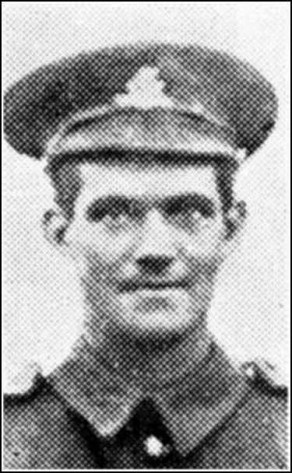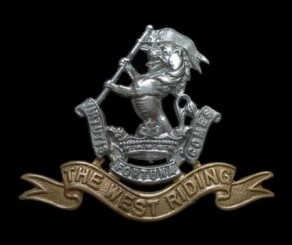
27 August 1915
INGLETON – War Items
Lance Corporal James Metcalfe, who is a bomb thrower in his company, was wounded above his right knee by the explosion of an enemy bomb on July 18th. After spending some time in a French hospital, he was removed to a convalescent home in Perth, and this week he has been recuperating at home. He reports himself at Skipton on Saturday next.
16 June 1916
INGLETON – War Items
Captain E. Walling and Private T. Bonnick have been spending a few days at home on leave from the front, and amongst those who have been allowed a few days from various training camps are Cadet G. Walling, Sergt. W.J. Routledge, Private A. Jowitt, Private J. Waring, Private W. Robinson, Private Fred Dixon and Private J. Sutton. Privates Frank Dixon and J. Metcalfe, who were wounded a short time ago, are now in England and are reported to be progressing favourably.
28 July 1916
INGLETON’S YOUNGEST ‘TERRIER’ REPORTED WOUNDED
Mrs. Chris. Hodgson, Backgate, Ingleton, has had a letter from Corpl. J. Metcalfe, informing her that her youngest son, Pte. W. Hodgson, of the 6th Duke of Wellington’s West Riding T.F., had been wounded by shrapnel in several places. Pte Hodgson was the youngest of the Ingleton Territorials to go and fight for King and Country at the outbreak of the War and the hope is general that his wounds are not of a serious nature.
15 September 1916
METCALFE – Died in hospital in France from wounds received in action, September 3rd, 1916, Sergt. J. Metcalfe, Duke of Wellington’s Regiment, son of Mr. and Mrs. Sylvester Metcalfe, Ingleton.
15 September 1916
INGLETON – INGLETONIANS KILLED AND WOUNDED
Private J. W. Robinson, whose mother resides in Back Gate, Ingleton, was also killed by the same shell. The following letters give particulars:–
September 4th 1916
“Dear Mrs. Robinson, – I regret exceedingly to have the painful duty of writing to inform you that your son, Pte. J. W. Robinson, was killed in action yesterday, September 3rd, as a result of a shell which came into the trench. After the explosion I, with one of his comrades, started to carry him to the dressing station, but he died a few minutes before he reached the doctor. He did not suffer much pain. I, on behalf of his comrades and myself, offer you the sincerest of sympathy in your bereavement. Of his qualities as a soldier and his devotion to duty I can only speak in the highest terms, as he was always ready for any duty. He was of a bright cheery disposition and he will be greatly missed in the platoon to which he belonged. Believe me, yours in sympathy.
“ARCHIBALD McCOLL, 2nd Lieutenant, West Riding Regiment”
September 4th 1916
“Dear Friends, – I am writing to you and I don’t know how to tell you. You don’t know how I feel, but it has to be done. I am sorry to have to tell you poor Jack, your nephew, got killed yesterday, and all the boys are very sorry. He got hit with a piece of shell and died in a minute or two. He did not suffer much at all. It was only about ten yards from him when it was done, and there was a lot more knocked out with the same shell. I am very sorry for his poor mother, and I am sure it will be a shock for you all. He was one of the very best of lads in our Battalion, and everybody liked him, and he has gone down for a good cause, same as many thousands more. We went up to the trenches together, and we were quite lively, but you know this is an awful game. Just now where we are it is a worse quarter than where we were last year at this time. It is simply ‘hell’ and nothing else, and he is a lucky man that gets through it. It is hard lines when we lose a pal like Jack; he was one that was always in for a bit of fun and we shall always miss him very much. We slept together the weeks before we went, and I shall miss him more than a lot of them because I have known him all his life. They buried him last night with lots more of our poor fellows. Jim Metcalfe got wounded with the same shell and Billy Preston, and those two have gone down the line somewhere, and I think they will pull through in time. You must tell his poor mother how sorry I am to write this letter. From your friend.
“C. R. SEARS”
15 September 1916
INGLETONIANS KILLED AND WOUNDED
Mr. and Mrs. Sylvester Metcalfe, Paradise Row, have received intimation that their son, Lance-Corporal James Metcalfe, Duke of Wellington’s West Riding Regiment, has died of wounds in France. The following letters give details:–
September 4th 1916
“Dear Mrs. Metcalfe, – I regret exceedingly to have the painful duty of writing to inform you that your son, Sergt. James Metcalfe, has died of wounds received in action yesterday. He was wounded with the explosion of a shell in the trench where we were. I saw him as he was being carried down the trench to the dressing station and he was very cheerful under the circumstances, and I thought that he would have a speedy recovery, but today I got the sad news that he had died in hospital. I, on behalf of his comrades and myself, offer you our sincerest sympathy in your bereavement. Of his qualities as a soldier, his devotion to duty and his character I can only speak in the very highest terms. As one of my platoon sergeants he was of great assistance to me, and was always ready and willing for any duty. He leaves a place in the platoon which will be hard to fill. Your other son, Pte. S. Metcalfe, has today gone to the place of interment to visit the grave. You will in due course receive official notice from the War Office. Again assuring you of the deepest sympathy.
“Believe me, Yours sincerely, ARCHIBALD McCOLL, 2nd Lieut. attached Duke of Wellington’s West Riding”
September 4th 1916
“Dear Mrs. Metcalfe, – I regret to be the bearer of the sad news to you that your son died here this morning and was buried today by the Church of England Chaplain, Mr. Barnes, in Forceville Military Cemetery. I presume he has written you, but I would like to add this word of sincere sympathy. May God sustain you in your sorrow.
“Faithfully yours, D. TAIT PATTERSON, C.F.”
Mr. and Mrs. Metcalfe’s eldest son lost a leg in the battle of Mons, and they have two other sons serving their King and Country, one in the Army and the other in the Navy.
05 January 1917
INGLETON – WAR ITEMS
After being four months in hospital, Corporal W. Preston, eldest son of Mr. John Preston, fruiter and fishmonger, is now home on 10 days’ leave. He was wounded in the face with shrapnel, a part of which has not been extracted. He was able to walk to a dressing station in the trenches, and was in the act of climbing over when a machine gun bullet passed through one leg and lodged in the knee of the other. He was between Sergeant J. Metcalfe and Pte. J.W. Robinson when they had the misfortune to be killed.
Other who have been home are: Sergeant W. Routledge (direct from the trenches), Corporal J.W. Routledge (his father), Corporal T. Heaps (Military Medallist) and Private Sherwin.
22 February 1918
INGLETON – IN MEMORY OF THE FALLEN
A memorial service for Ingleton men who have fallen in the war was held in St. Mary’s Church on Sunday evening. There was a large congregation, and the service was of an impressive character. The Union Jack was hoisted half-mast on the tower during the day. At the commencement of the service the organist, Mr. C. Bentham, played ‘O rest in the Lord’, and at the conclusion the Dead March in ‘Saul’, 'How bright these glorious spirits shine’, and other hymns appropriate to the occasion were sung, as was also the National Anthem. Standing on the Chancel steps, Bugler J. Robinson sounded the ‘Last Post’, and its solemn and eerie notes reverberated along the aisles.
Before commencing his address, the vicar, the Rev. D. T. Davies, read out the list of those who had fallen, as follows:–
Killed in action: Second-Lieutenant G. Kirk, Sergeant J. Metcalfe, Privates A. Noble, G. Scholey, C. Tomlinson, J. Smith, W. A. Hodgson, J. W. Wadeson, J. W. Robinson, J. Clapham, W. Smith, J. Schofield, J. Kettlewell, W. Marklew, E. Askew, P. Fletcher, G. Metcalfe, A. M. Booth, J. Woodhouse, W. Bolton, and J. [W.H.W.] Wilson.
Died in hospital: Privates W. H. Wignall and C. Newsholme.
Torpedoed: C. Grant.
Missing; Sergeant R. E. Walker, Privates A. Sherwin, W. Northey, E. Robinson, J. Saul, and W. [J.C.] Bradford.
The Vicar, speaking from the words, ‘Greater love hath no man than this, that a man lay down his life for his friends’, said that the occasion brought them face in face with a question that was momentous to everyone, and the list which he had just read made them pause and ask the question, “Is the cause for which we are fighting of such a nature that these sacrifices are necessary?” They must remind themselves of the causes which led to the war. Our honour was pledged to protect a small country from an oppressing wrong, and we were compelled to stand by them. They were standing to protect a weak country from a fearful wrong committed by one of the strongest nations in the world – from a military point of view the strongest – a nation that was steadily prospering year after year and which had been training its manhood to satisfy its mad ambition for power. It was becoming clear, especially during the last few weeks, that the dominant note running through their proposals had been their determination that might should conquer over right, and that they would rule as masters over the whole world. When they analysed the causes they saw that the principles of justice and righteousness were struggling against oppression and wrong-doing. They had seen an attempt to impose injustice on the whole world, to impose the doctrine that might is right and mercy unknown by the will of one man, and to sweep away religion, man’s guidance, in a moment.









No comments yet.